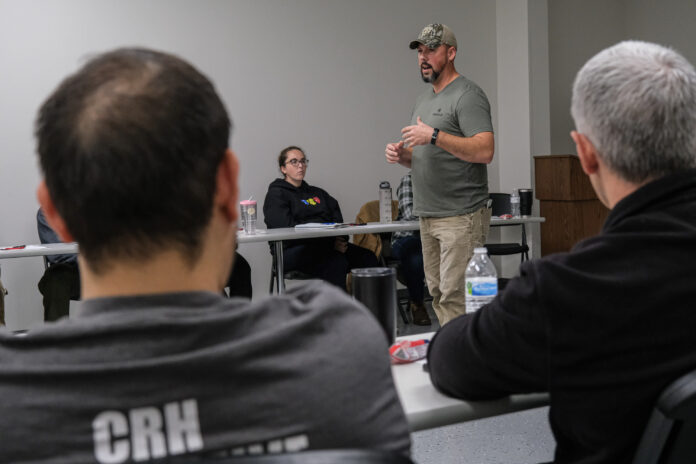
COLUMBUS, Ind. — Imagine answering hard questions, completing a timed crossword puzzle, or counting several objects on a floor — all while three different voices are being pumped simultaneously into your head.
That is just one of several exercises undertaken by 17 officers from four local law enforcement agencies as Bartholomew County becomes the 12th Indiana county to begin providing Crisis Intervention Training (CIT).
Sgt. Andrew Whipker of the Bartholomew County Sheriff’s Department and Sgt. Alyson Eichel of the Columbus Police Dept. facilitated the 40-hour program for officers from CPD, BCSD, the Columbus Regional Health and the Hope police departments.
The exercise with multiple voices, provided by an MP3 player and headphones, is meant to simulate to a limited degree what someone with schizophrenia might be experiencing,” Whipker said.
After training, an officer should understand they might have to repeat themselves to an individual with schizophrenia because it is extremely difficult for them to give anything their full concentration, he said.
While most of the week-long training is designed to help police officers better understand various forms of mental illness or addiction disorders, participants also learn to better recognize someone who is going through a crisis, Whipker said.
“For example, they may have had a recent death in the family, and are having emotional problems related to unemployment or financial troubles,” Whipker said. “They may not be eating or sleeping, and may have made vague threats of wanting to harm themselves. Now, they might not be in need of immediate hospitalization and treatment, but they could benefit from some other outpatient resource.”
In the past, law enforcement have had encounters individuals suffering from anxiety, depression, economic troubles and fear, but felt there was nothing they could do with them, he said.
But that has begun to change now that Bartholomew County has developed a Crisis Intervention Training team that includes nonprofits, mental health professionals and law enforcement representatives who meet on a monthly basis, Eichel said.
“This type of communication hasn’t existed between law enforcement and the mental health community in Bartholomew County since – probably forever,” Whipker said. “It’s brought a lot of change for the good.”
For the complete story, see Saturday’s Republic.




